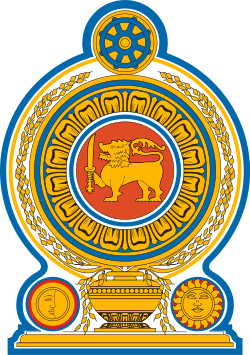Judiciary of Sri Lanka
 |
| This article is part of a series on the politics and government of Sri Lanka |
|
Executive |
|
|
Political parties |
|
|
Administrative geography
|
|
Foreign policy |
|
Related issues
|
|
Politics portal |
The judiciary of Sri Lanka is the system of courts that interprets and applies the law in Sri Lanka. It is set out in Constitution, which defines courts as independent institutions within the traditional framework of checks and balances.
Sri Lankan courts are presided over by professional judges, judges of the Supreme Court are appointed by the President with the nomination of the Parliamentary Council, others by the Judicial Service Commission.[1]
Law
Sri Lanka has a legal system which is an amalgam of English common law, Roman-Dutch civil law and Customary Law.
Courts
Supreme Court
The Supreme Court of Sri Lanka is the highest judicial instance and final court of appeal.[2][1] It is composed of the Chief Justice and not less than six and not more than ten Puisne Justices. Judges are appointed by the President with the nomination of the Parliamentary Council and serve for a lifetime period (65). The Supreme Court is the final appellate Court and has jurisdiction in constitutional matters.
Court of Appeal
The Court of Appeal hears all appeals from the High Court and courts of first instance. The court is composed of the President of the Court and not less than six and not more than eleven other Judges.
High Courts
The High Court has jurisdiction in criminal matters.[1]
District Courts
The district courts in civil matters.[1]
See also
- Government of Sri Lanka
- Law of Sri Lanka
References
- ↑ 1.0 1.1 1.2 1.3 "Judicial System of Sri Lanka". Commonwealth Governance. Retrieved 17 November 2013.
- ↑ "COURTS AND CASES SRI LANKA". lexadin. Retrieved 17 November 2013.
External links
| ||||||||||||||||||||||||||
| ||||||||||||||